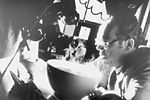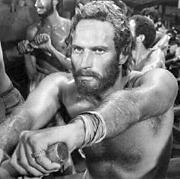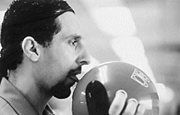PERHAPS THE MOST original filmmaker working today, Errol Morris continues to test the line between fiction and nonfiction film. Indeed, his documentaries like The Thin Blue Line (1988) belong in a surreal subgenre all of their own, mixing the profound and the wacky.
MR. DEATH: THE RISE AND FALL OF FRED A. LEUCHTER, JR.
directed by Errol Morris
opens February 11 at Varsity
Here, Morris almost tangentially examines the Holocaust through the myopic eyes of a self-taught designer of execution devices who becomes convinced that the whole thing never happened. A smiling, obsessive geek who drinks 40 cups of coffee a day and smokes continually, Fred A. Leuchter Jr. is strangely likeable or at least not immediately unlikeable—like an outtake from Morris’ 1997 Fast, Cheap, and Out of Control. Morris initially reveals the man’s eccentricities and search for a more “humane” method of execution with a wry, macabre humor. Introduced as a sort of Dr. Frankenstein, posed beneath blue lightning and sizzling voltage meters, Leuchter unselfconsciously discusses the exploding eyeballs and flayed “meat” of botched executions—think of The Green Mile—while flicking deadly dials and toggles with didactic glee.
The two make a great team, as Morris punctuates, exaggerates, and eviscerates the chattering Leuchter with his hallmark techniques. He constructs a rich character study out of grainy color and B&W footage, dramatic reenactments, odd camera angles, and a whimsical soundtrack. Morris claims no objectivity, but he is fair, even as his reaction slides from clinical dispassion to bemusement to horror—and finally to pity.
The turning point comes when neo-Nazis hire Leuchter to investigate the Holocaust (owing to his knowledge of gas chambers). Mr. Death then veers toward dark profundity and, necessarily, loses much of its humor. Motivated, he says, by a belief in the First Amendment, Leuchter journeys to Auschwitz with his fianc饬 enthusiastically desecrates the monument, and puts stolen brick samples through a flawed chemical analysis. Convinced that no one was gassed, he pens a report that brings him fame on the hate circuit but ruins him personally and financially.
Not demonstrably an anti-Semite, Leuchter simply refuses to admit the fallacy of his method. Is he misguided or misanthropic? Was he, as his ex-wife later says, seduced by the lies that put him in the spotlight? Or is vanity at the core of his denial? Morris leaves this portrait of Leuchter—and his associative link to the Nazis themselves—open to interpretation. Like its protagonist, Mr. Death is a compelling oxymoron: a buoyantly bleak look at the broader consequences of one man’s shortsightedness.








